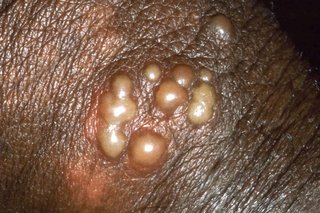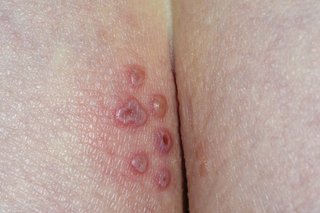Experiences with
Genital herpesCheck if you have genital herpes
Symptoms of genital herpes include:
- small blisters that burst to leave red, open sores around your genitals, anus, thighs or bottom – the sores may be less red on brown or black skin
- tingling, burning or itching around your genitals
- pain when you pee
- discharge that is not usual for you



- you have symptoms of genital herpes
Go even if you have not had sex for a long time, as blisters can take months or years to appear.
Treatment for genital herpes
There's no cure for genital herpes. Symptoms clear up by themselves, but the blisters can come back (an outbreak or recurrence).
Treatment from a sexual health clinic can help.
Treatment the first time you have genital herpes
You may be prescribed:
- antiviral medicine to stop the symptoms getting worse – you need to start taking this within 5 days of the symptoms appearing
- cream for the pain
If you've had symptoms for more than 5 days before you go to a sexual health clinic, you can still get tested to find out the cause.
Treatment if the blisters come back
Go to a GP or sexual health clinic if you've been diagnosed with genital herpes and need treatment for an outbreak.
Antiviral medicine may help shorten an outbreak by 1 or 2 days if you start taking it as soon as symptoms appear.
But outbreaks usually settle by themselves, so you may not need treatment.
Recurrent outbreaks are usually milder than the first episode of genital herpes.
Over time, outbreaks tend to happen less often and be less severe. Some people never have outbreaks.
Some people who have more than 6 outbreaks in a year may benefit from taking antiviral medicine for 6 to 12 months.
If you still have outbreaks of genital herpes during this time, you may be referred to a specialist.
How to deal with outbreaks yourself
There are things you can do if you've been diagnosed with genital herpes and you're having an outbreak.
keep the area clean using plain or salt water to prevent blisters becoming infected
apply an ice pack wrapped in a flannel to soothe pain
apply petroleum jelly (such as Vaseline) or painkilling cream (such as 5% lidocaine) to reduce pain when you pee
wash your hands before and after applying cream or jelly
pee while pouring water over your genitals to ease the pain
do not wear tight clothing that may irritate blisters or sores
do not put ice directly on the skin
do not touch your blisters or sores unless you're applying cream
do not have vaginal, anal or oral sex until the sores have gone away
How genital herpes is passed on
Genital herpes is very easy to pass on (contagious) from the first tingling or itching of a new outbreak (before any blisters appear) to when sores have fully healed.
You may also be able to pass on the virus even if you do not have any symptoms.
You can get genital herpes:
- from skin-to-skin contact with the infected area (including vaginal, anal and oral sex)
- when there are no visible sores or blisters
- if a cold sore touches your genitals
- by transferring the infection on fingers from someone else to your genitals
- by sharing sex toys with someone who has herpes
You cannot get genital herpes from towels, swimming pools, saunas or toilet seats as there is no skin-to-skin contact.
Protecting against genital herpes
You can reduce the chances of passing on genital herpes by:
- using a condom every time you have vaginal, anal or oral sex – but herpes can still be passed on if the condom does not cover the infected area
- avoiding vaginal, anal or oral sex if you or your partner has blisters or sores, or a tingle or itch that means an outbreak is coming
- not sharing sex toys – if you do, wash them and put a condom on them
Symptoms of genital herpes include small blisters around your genitals, anus, thighs or bottom and pain when you pee.
Treatments for genital herpes include antiviral medicine and cream for any pain. You can get treatment at a sexual health clinic.
You can get genital herpes from skin contact with the infected area even when no sores or blisters are visible.
Related links

HealthUnlocked contains information from NHS Digital, licensed under the current version of the Open Government Licence